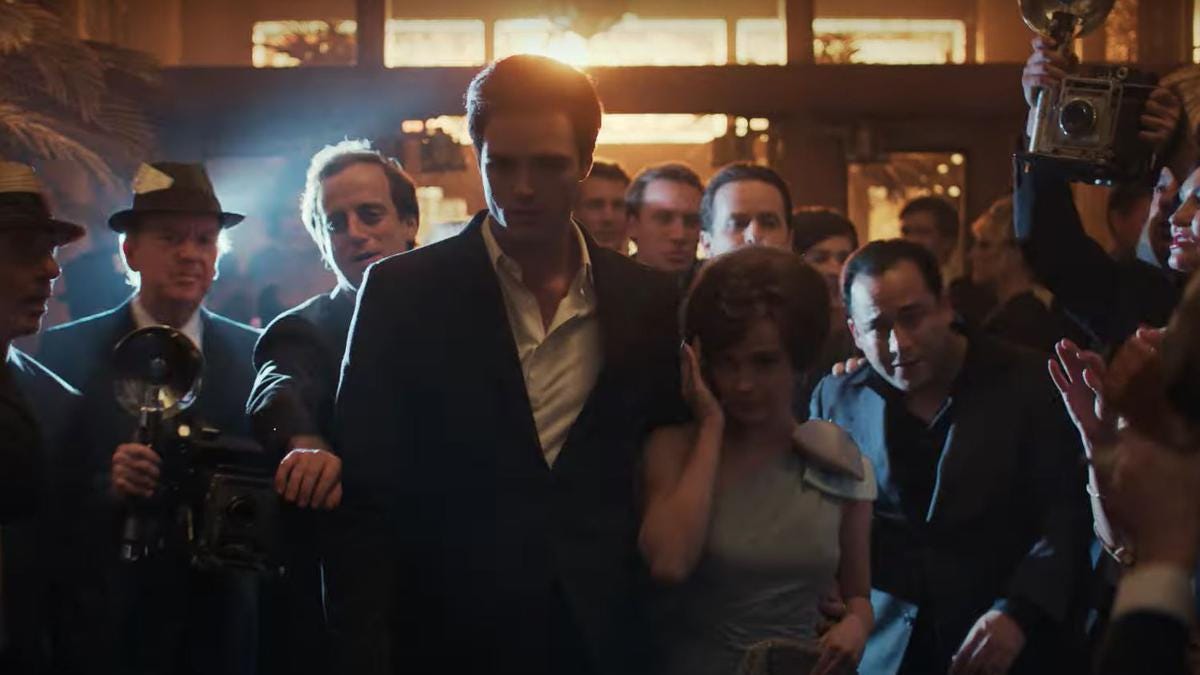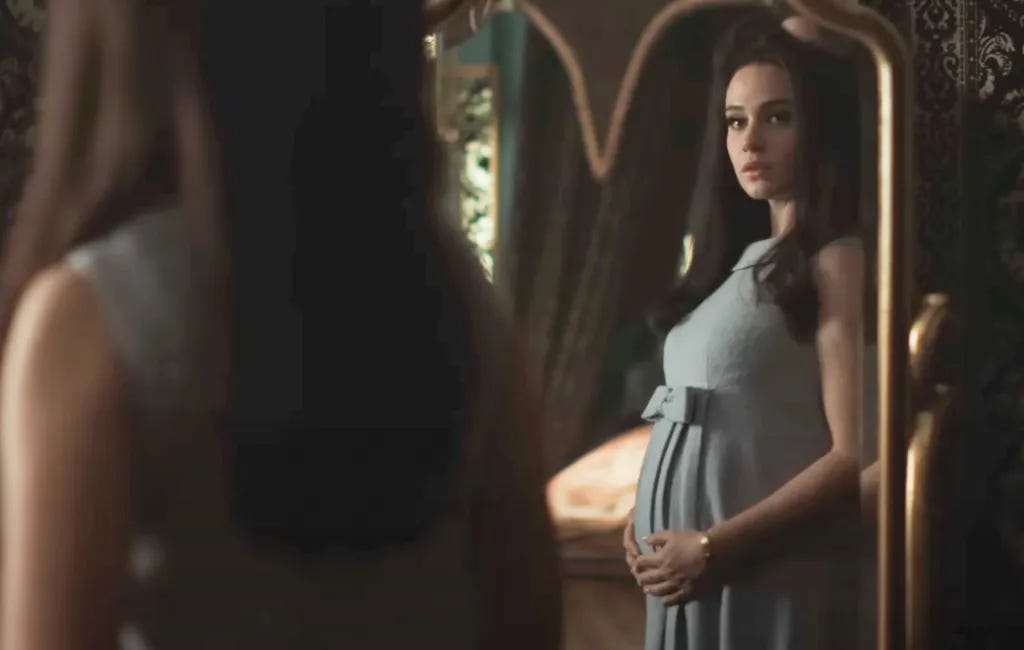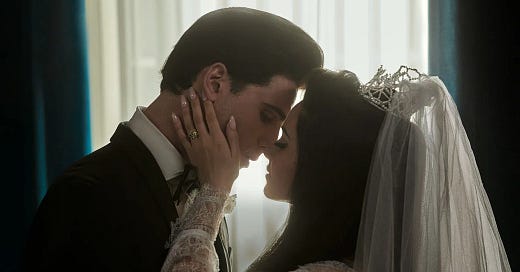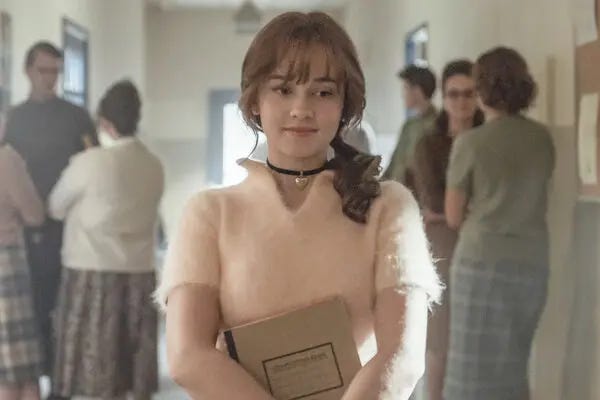
I’m a little tired of biopics.
Like we get it. People did stuff. Then they died. Circle of life my dudes.
I guess famous people are a little more interesting because if I did have a lot of money, I would definitely be living life differently. It seems like rich people operate through a different set of rules and I’d just like to know why that is because it seems very unfair and weird. Like, people are just people. Why put them on a pedestal?
Anyways. Biopics. I’m not as big into documentary filmmaking as I should be, but biopics kind of toe that line, right? It really depends on the director and the story they want to tell, but biopics to me are the closest narrative equivalent we have to documentary filmmaking, and it’s often about people the public is already invested in so it’s a good way to make a film and make some money off it.
I can tell you now that Baz Luhrmann’s Elvis did not whet any appetite I had for the music man. It actually made me very aware that I had not a single desire or hunger to see Elvis in any sort of light yet it was presented in a very long 3-hours to me. Where I had the slow, impending realization that I was retaining nothing from the flashing lights on the screen.
I was going to say the same for Priscilla, but I was wrong. Elvis’ life from his wife’s perspective? How would that interest me?
Well,
Because I’m a woman.
Because it’s beautifully shot.
This is the other side we don’t get to see.
Yes, yes, we can protest the oversaturation and poorly made biopics of famous people past, but we should also rally behind the good ones; the stories of people who usually don’t have a say, who have had their voices shuttered for so long, to hear their tale feels like a whisper from a long locked vault.
Production Design

God I love a good period piece. This isn’t even really a period piece because it was the 1940s-ish but the fashion and architecture was so different from our sleek, minimalist modernism trash of today that the gaudiness and flamboyant set pieces are beautiful.
Tamara Deverell was the production designer on Priscilla and she really packed in detail after detail in every single prop to make Graceland feel real. Stacey Battat did a phenomenal job with the costume design while hair department lead Cliona Furey and makeup department head Jo-Ann MacNeil also helped Sofia Coppola’s vision come to exquisite life.
Every single department came together to create a soft palette, gentle lighting, a misty sepia overtone to transport us to the past.
These are memories.
More importantly, these are Prisicilla’s (Cailee Spaeny) memories of her life with Elvis (Jacob Elordi). Which, as star-studded and fantastical as we always think, was more than a little disenchanting when you are too close to a sun.
The cars are time specific, the plates, the rugs, the furniture, the goddamn larger than life hair. Everything is specifically tuned to life as Priscilla remembers it. Everything is perfect.
A little too perfect. The colors match, the furniture elevates each other and there is Priscilla. Just over 15 years old. A child in a MANsion. Try as she might to look the part and be just the woman Elvis wants as his wife.
Everything in Graceland has a place and Priscilla is tiptoeing around, hoping to not make a nuisance of herself in what can only be described as a fantastical dream. She can’t move anything for fear of waking up from this dream, where THE Elvis Presley wants her, Priscilla Beaulieu.
To see Priscilla float through the rooms, not touching anything and barely being allowed outside, makes this beautiful mansion into little more than a stylish prison.
A modern-day prison. The appearance of grandeur hiding the sadistic truth of an unbalanced home life.
And that’s just on how this movie looks.
Womanhood

So what boggled my mind was the actual fucking age gap between Priscilla and Elvis. Claim it with the times or a love expanding beyond age, her being a literal child when Elvis started a relationship with her as a full grown man, drafted into the military makes me feel all sorts of queasy.
That is not a flattering light for the King of Rock, but it is a fact of life for how their relationship progressed from the get.
And like most relationships with such a massive age gap there comes the question of love. And control. Can there truly be something there if minds do not meet, if eyes cannot reach, if the status of the relationship hinges on the mood swings of the more prominent partner?
Priscilla literally grows up in this relationship, with the clout of being Elvis’ partner, graduating high school, become a woman, becoming his wife. All the pivotal moments of her life were secondary to his career as a musician and later as a not-so-great actor, that any movement of her own caused crashing, ricocheting waves that made Elvis lose his cool.
This is not the Elvis we often see portrayed in media. This is not how he was all the time. But the moments Director Coppola discerns from Priscilla’s memoir are pivotal ones, albeit negative though they are transformative.
What we get out of this movie is a long repeated story of women in unloving relationships: it’s all a performance. Priscilla had to play the perfect wife and mother. She had to turn a blind eye to his affairs and she had to stay at home waiting on his call no matter the time of day. Her desperate desire to be loved by Elvis, to be his and only his, kept her on a very short leash for most of this relationship.
Substitute any woman from the 1940s/1950s into Priscilla’s relationship and we get much the same story of the time: women silenced, relegated to lesser roles, promised love and affection and given scraps of love.
This is a story of a Hollywood couple that didn’t last, but it is also a story highlighting the plight of women since forever.
What Stories to Tell
We get it. The King of Rock had a wild life. It was romantic, it was professional, it was musical, it was devastating.
Elvis Presley’s life was anything but boring.
But Priscilla’s… for lack of a better word— hers was boring. It lacked the stardom and the nightlife of Elvis’ adventures. It wasn’t as eventful or fruitful as her husband’s but being adjacent to his life was a charm and an adventure all on its own. He shone so brightly, just being in his vicinity created a sort of experience one had to live through to understand.
Just as Elvis had adoring fans and a grandeur that couldn’t be matched, Priscilla’s life is just as meaningful because all life is precious.
Hers just happens to have been shoved into the limelight seemingly against her will.
We see the king in a new light. A dark and demented one. Where he isn’t put together and he has bad, terrible moments and flashes of anger so devastating we feel like it can’t be real.
How can a man so pivotal to rock music be such a terrible person?
Well.
A person can have accomplishments and still be a bad person. A person can be good but do bad things. A person can make honest, emotional mistakes.
Though it focused on the negatives as most dramas tend to do, it highlights the parts of their relationships that is oft neglected in light of shining proudly on Elvis.
This is Priscilla’s story. Yes, it is in relation to Elvis, but it is how she experienced the world, it is how she saw it come crumbling down.
People may disagree or exclaim that the version of Elvis they concocted in their minds through a parasocial mindlink is different— and that’s fine.
This is a version of Elvis that existed and continues to exist in Priscilla’s memories.
Just as much as Elvis’ life is shared to the world, it is also her life.
In sickness and in health.
This is her story.




